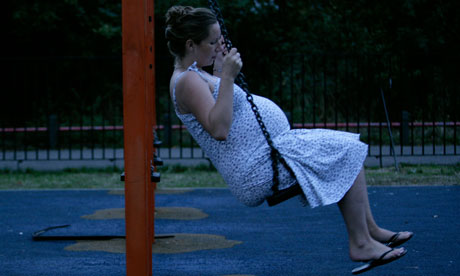
I knew exactly what was happening. I'd had recurring problems with clinical depression since I was 19 so the wild mood swings, the feelings of despair and the physical lethargy were all, sadly, familiar. What I didn't understand was why now. I'd got good at identifying things that triggered my depressive episodes, but none of them applied. I was newly pregnant, and delighted to be so.
A lot of my pregnancy-related reading had highlighted the risk of postnatal depression. I knew that my history suggested I might be more susceptible to it, and it was something I would have to be vigilant about in the first few months of motherhood, but I'd never read anything about prenatal depression. I'd never even heard the term, and I'd learned a lot about mental health over the years, even taking a degree in psychology to further my interest.
The mental health charity Mind says an estimated one in 10 women suffer from depression during pregnancy, a figure that echoes the rate of depression among the wider population. But for many it will be the first time they have encountered the disease, and no one is entirely sure why it should strike first during pregnancy.
"The exact reasons are complex," says Beth Murphy, the head of information at Mind. "The hormonal changes which occur during pregnancy are a factor, as is the fact that many pregnant women feel isolated and discriminated against. In addition, a lot of women feel that there is more stigma attached to being depressed whilst pregnant. There is a widespread assumption that they should be happy so they may be reluctant to talk to about their feelings or seek help which, of course, can make the problem worse."
Help, however, is there. As soon as I felt I was losing control of my moods I spoke to my midwives, and I have nothing but praise for the treatment I got. It was like being on the receiving end of a rapid reaction force. I was sent to my GP that afternoon, he promptly informed local mental health officials, and within days I was visited and assessed at home.
Treatment varies from person to person and depends on the severity of the depression. Milder episodes respond well to talking therapies and to better diet and more exercise. More severe attacks, however, may require medication. As a general rule, doctors will avoid putting pregnant women on antidepressants as the jury is still very much out as to whether they harm the foetus or not, but a balance has to be struck because the environment in the womb will also affect the baby's development.
For example, some research suggests that high levels of the stress hormone cortisol in the amniotic fluid can affect the way the baby's brain develops, making them more susceptible to stress, anxiety and depression in later life. Stress in pregnancy has also been linked to low birth weight and premature delivery, so if a pregnant women is very depressed, medication may be the safer option for mother and child.
By the time I reached the second trimester things had calmed down and I began to feel the sense of equanimity that can come with imminent motherhood. And since my daughter's birth nearly a year ago, there hasn't been a whiff of depression. It's been quite the opposite - I've never felt so happy and at peace. But for many women the path to motherhood can go awry very early on, with potentially serious consequences for mother and baby.
Have you suffered from pre- or postnatal depression? Share your experiences below.

